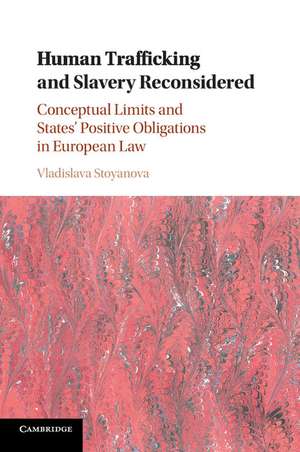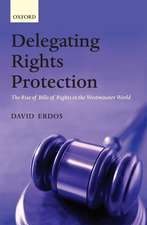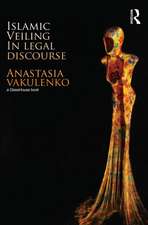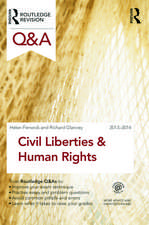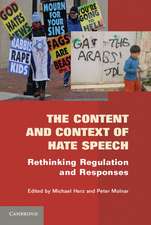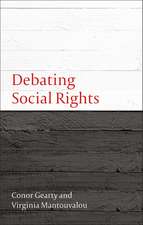Human Trafficking and Slavery Reconsidered: Conceptual Limits and States' Positive Obligations in European Law
Autor Vladislava Stoyanovaen Limba Engleză Paperback – 20 iun 2018
| Toate formatele și edițiile | Preț | Express |
|---|---|---|
| Paperback (1) | 362.89 lei 6-8 săpt. | |
| Cambridge University Press – 20 iun 2018 | 362.89 lei 6-8 săpt. | |
| Hardback (1) | 898.66 lei 6-8 săpt. | |
| Cambridge University Press – 15 mar 2017 | 898.66 lei 6-8 săpt. |
Preț: 362.89 lei
Nou
Puncte Express: 544
Preț estimativ în valută:
69.44€ • 72.50$ • 57.34£
69.44€ • 72.50$ • 57.34£
Carte tipărită la comandă
Livrare economică 15-29 aprilie
Preluare comenzi: 021 569.72.76
Specificații
ISBN-13: 9781316614778
ISBN-10: 1316614778
Pagini: 512
Dimensiuni: 153 x 230 x 31 mm
Greutate: 0.74 kg
Editura: Cambridge University Press
Colecția Cambridge University Press
Locul publicării:Cambridge, United Kingdom
ISBN-10: 1316614778
Pagini: 512
Dimensiuni: 153 x 230 x 31 mm
Greutate: 0.74 kg
Editura: Cambridge University Press
Colecția Cambridge University Press
Locul publicării:Cambridge, United Kingdom
Cuprins
1. Introduction; Part I. The Human Trafficking Legal Framework: 2. Origins, context and the currently valid law; 3. The definition of human trafficking in international law; 4. Positive obligations under the human trafficking legal framework; Part II. The Human Rights Law Framework: 5. The historical background; 6. Definitions with contemporary relevance; 7. The relationship between the concept of human trafficking and the concepts of slavery, servitude and forced labour; 8. Positive obligations under human rights law; 9. Conclusion.
Recenzii
'Vladislava Stoyonova's book is as intellectually courageous as it is meticulously researched. She effectively challenges the dominant discourse of human trafficking, showing that human rights are more effectively ensured by grappling with the modern meaning of slavery, servitude, and forced labour. This is a fine legal analysis, proving the wisdom of grounding advocacy in legal norms of indisputable authority.' James Hathaway, University of Michigan Law School
'The issue of trafficking in human beings and its relationship with slavery has risen to the top of political agendas around the world as border controls and movement of persons has become subject to increasing strict rules. This book takes the issue seriously and examines the development of anti-slavery and anti-trafficking legal frameworks and how they operate within the contours of state sovereignty claims. It is a magistral work which deserves to be read by anyone seeking to understand what trafficking and slavery mean in the 21st century.' Elspeth Guild, University of London and Radbound University Nijmegen, Netherlands
'Dr Stoyanova's book, based in part on her doctoral thesis, is a very important contribution to our understanding of the nature of states' obligations, particularly under the Council of Europe Convention on Action against Trafficking in Human Beings, to help, protect and support those who have been trafficked. Her critical analysis of these duties is superbly researched and clearly establishes her as a significant thinker and scholar in the debates on human trafficking.' Ryszard Piotrowicz, Aberystwyth University and Member of the Council of Europe Group of Experts on Action against Trafficking in Human Beings
'This provocative and timely book offers refined definitions of the three wrongs set out in Article 4 European Convention on Human Rights, slavery, servitude, forced labour, and considers states' positive obligations to ensure protection against these wrongs. Dr Stoyanova's intellectual ambition is in evidence in her meticulous analysis and argumentation, and in her novel legal arguments. She assesses prevailing interpretations of these legal terms, and where she finds them lacking, offers her own alternative interpretations. The book is broad in scope. As well as the European protections, it also integrates the international genealogy of these wrongs, and draws in other aspects of international law, including International Criminal Law, the InterAmerican Court's work on right to legal personality.' Cathryn Costello, Refugee Studies Centre, University of Oxford
'In conclusion, this book is a precious tool in aiding our understanding of the full range of obligations deriving from legal instruments dealing specifically with THB, on the one hand, and from human rights instruments more generally, on the other.' Nicolas Le Coz, International Journal of Refugee Law
'The issue of trafficking in human beings and its relationship with slavery has risen to the top of political agendas around the world as border controls and movement of persons has become subject to increasing strict rules. This book takes the issue seriously and examines the development of anti-slavery and anti-trafficking legal frameworks and how they operate within the contours of state sovereignty claims. It is a magistral work which deserves to be read by anyone seeking to understand what trafficking and slavery mean in the 21st century.' Elspeth Guild, University of London and Radbound University Nijmegen, Netherlands
'Dr Stoyanova's book, based in part on her doctoral thesis, is a very important contribution to our understanding of the nature of states' obligations, particularly under the Council of Europe Convention on Action against Trafficking in Human Beings, to help, protect and support those who have been trafficked. Her critical analysis of these duties is superbly researched and clearly establishes her as a significant thinker and scholar in the debates on human trafficking.' Ryszard Piotrowicz, Aberystwyth University and Member of the Council of Europe Group of Experts on Action against Trafficking in Human Beings
'This provocative and timely book offers refined definitions of the three wrongs set out in Article 4 European Convention on Human Rights, slavery, servitude, forced labour, and considers states' positive obligations to ensure protection against these wrongs. Dr Stoyanova's intellectual ambition is in evidence in her meticulous analysis and argumentation, and in her novel legal arguments. She assesses prevailing interpretations of these legal terms, and where she finds them lacking, offers her own alternative interpretations. The book is broad in scope. As well as the European protections, it also integrates the international genealogy of these wrongs, and draws in other aspects of international law, including International Criminal Law, the InterAmerican Court's work on right to legal personality.' Cathryn Costello, Refugee Studies Centre, University of Oxford
'In conclusion, this book is a precious tool in aiding our understanding of the full range of obligations deriving from legal instruments dealing specifically with THB, on the one hand, and from human rights instruments more generally, on the other.' Nicolas Le Coz, International Journal of Refugee Law
Notă biografică
Descriere
An original analysis of the definition and scope of the right not to be held in slavery, servitude and forced labour.
